DR ELLIE CANNON: Help! Sex is painful at 72 but I can’t take HRT pills to cure it
I am 72, very fit and active, and recently met someone I’d like to have a relationship with – but I’m finding sex painful. My GP says HRT is the only thing that will help, but I can’t take it as I have a family history of breast cancer. What can I do?
Pain during sex is something that hits many women after the menopause – the most common cause is vaginal dryness.
During middle age, production of the female hormone oestrogen drops. Primarily this signals an end to fertility, but this change in body chemistry can bring about a whole raft of difficult symptoms.
Among its many roles, oestrogen is responsible for maintaining the moisture and health of the vulva and vaginal area. When there is less oestrogen, the area becomes drier, intercourse become less comfortable and women are more prone to infections.

Pain during sex is something that hits many women after the menopause – the most common cause is vaginal dryness, picture posed by model

A history of breast cancer in the family does not automatically prohibit a woman from taking HRT pills, stock image
Dryness can improve with standard hormone replacement therapy (HRT) tablets, which provide replacement oestrogen.
More from Dr Ellie Cannon for The Mail on Sunday…
It is worth being aware that HRT isn’t necessarily prohibited for women with a family history of breast cancer, although they are for a woman who has had breast cancer herself.
For those with an increased risk of breast cancer, a discussion needs to be had with the doctor about exact risks versus benefits of treatment, as well as ways to mitigate the risks, such as using low doses.
But for women who may not be able, or may choose not to take tablets, there are other options.
HRT can be given as a cream, gel, pessary or tablet used within the vagina. This is ideal for vaginal dryness and should be the first option for most women experiencing this problem.
It can be used daily for two or more weeks, followed by a maintenance regime of once a week or so to keep up the hormone levels.
Vaginal moisturisers are available at any pharmacy and can be used twice a week for comfort, and there are lubricants available for sexual activity. These can be used as an alternative to hormone treatment or alongside it. The website rockmymenopause.com offers helpful advice that is verified by healthcare professionals.
My GP has recommended I take statins. But I’ve read that people on statins do not live longer, on average, than people who don’t take them. If they don’t reduce the death rate, what’s the benefit?
All treatments come with risks and benefits. GPs weigh these up every day with their patients: are the positives of prescribing a drug or offering an operation worth the potential side effects or complications?
Ideally we should all ask that question more when we discuss treatments, and feel empowered to have that conversation with GPs. Asking what is the value of a treatment is perfectly valid, and I would say particularly so when it comes to statins.
Statins reduce the levels of cholesterol in the body, and harmful cholesterol (LDL) in particular. But that in itself is not a reason to take a tablet.
We used to give anyone with a high cholesterol a statin, but now we are more pragmatic. We use a specialised computer program called Qrisk to weigh up dozens of factors, from age, weight and family history to other illnesses a patient might have.
Statins will be offered to anyone who, according to this calculation, has a higher than average risk of a cardiovascular event – that could be a heart attack or a stroke. Both can be life-altering, if they don’t prove to be fatal.
Statins are proven to reduce the likelihood of these events, particularly in people who may be at high risk – for example, those with diabetes or people who have had a heart attack before. But, of course, this treatment is only one part of what has to be a concerted effort to stay well. There’s only so much your doctor can do.
Losing weight, exercising regularly, not drinking too much alcohol and keeping conditions such as high blood pressure under control are also vital.
My daughter has multiple sclerosis and struggles with urine infections which leave her very tired. The doctor says her bladder doesn’t empty properly, and prescribes antibiotics, but the problem keeps coming back. Do you have any solutions?
Multiple sclerosis is a condition that affects the brain and spinal cord, causing a whole range of symptoms.
Do you have a question for Dr Ellie?
Email [email protected] or write to Health, The Mail on Sunday, 2 Derry Street, London, W8 5TT.
Dr Ellie can only answer in a general context and cannot respond to individual cases, or give personal replies. If you have a health concern, always consult your own GP.
These can include problems with the nerves that control the bladder. Patients may find they need to go often, are unable to hold on and also have difficulty emptying the bladder completely.
If the bladder is not emptying properly, the stagnant urine within it becomes a source of potential infection.
Urinary problems are not just treated with repeated courses of antibiotics, but by dealing with the underlying issue of emptying properly – this should be done via a referral to a specialist. One solution is using a catheter. It may sound alarming but it’s a recognised option for people with the condition – a new, self-administered catheter can be used after each toilet visit to ensure the bladder is completely empty. It becomes routine for many, and infections become far less likely.
Specialist continence nurses teach individuals to use these, and can also explain other exercises and techniques for emptying the bladder. The MS Society has excellent information on bladder issues and can advise where to access this help.
Are Covid passports the way to keep us all safe?
Should unvaccinated people be barred from football matches, concerts and even pubs? The Government is planning to trial Covid vaccine passports next month, to see if it’s a viable route to opening up even more sections of society.
It sounds quite simple. If you’ve had a jab, a recent negative test or have natural immunity, you can enter a host of places, keeping them strictly Covid-free. Those who have none of the above, however, will be sent on their way.

Should unvaccinated people be barred from football matches, concerts and even pubs?
I think it’s a great idea – we still have a significant chunk of adults who are hesitant to be jabbed, and I bet being able to get back to the pub will convince many of them.
Israel is running a similar scheme with great success, as its infection rate continues to dwindle. But some say it’ll result in an unfair, two-tiered society.
I’m interested to know what you think. If you feel strongly either way, write and tell me.
Why we get you tip-top for an op
From time to time I hear from readers who say they’ve been told they need an operation but then, after being assessed, have been advised it can’t go ahead until they get another health problem under control.
It can be frustrating for the patient but it is vital we do this. Surgery, from the anaesthetic to the procedure itself, can be a huge ordeal for the body, so we need to make sure the patient has the best chance of doing well. And if something amiss is discovered, they might be instructed to make changes.
This could simply be a case of losing weight, but further investigations might be needed if, say, a vitamin deficiency or another problem is discovered.
To an extent, the onus is on the patient to persevere and do what they can. And, ultimately, once things have been resolved, the intended op should go ahead.
Source: Read Full Article